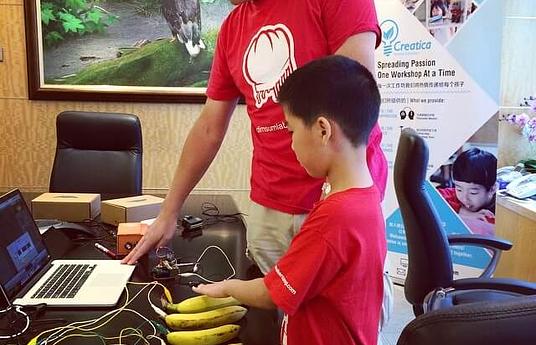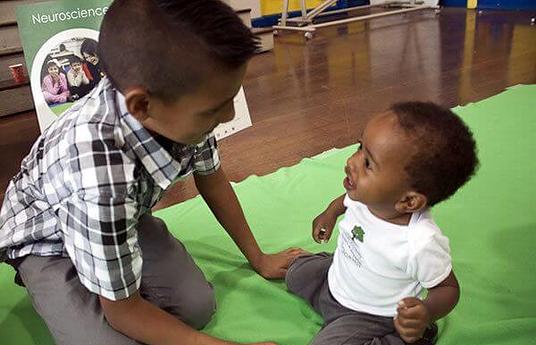One of the hardest things to do in education is what makes learning the easiest, motivating students. This double-edged sword is a mystical thing to everyone in the world, not just those in education. Getting inspiration to hit is incredibly difficult, especially in a world where procrastination is at the end of your fingertips in the form of the internet, but the dis-engagement in schools is particularly unique – and therefore has unique solutions.
First we have to separate out the difference between engagement, inspiration and motivation because they have different sources. Engagement – or disengagement – is possibly one of the easiest to recognize as it’s obvious what one of the main issues is – the widening gap between students' real lives and the world within the walls of the classroom.
A boom in technology means that students have all kinds of devices that many schools just can’t afford. When children have phones, tablets, digital games, laptops, computers, virtual reality equipment and a wealth of online content to amuse themselves with outside of school, it’s no wonder that school doesn’t make much sense when it doesn’t utilise these tools or focuses on skills such as handwriting and spelling which are becoming increasingly obsolete in a world of keyboards and spell-check.
There are a plethora of tools specially designed for the classroom to counteract this problem. Seppo, an online platform developed in education-dreamland Finland, was developed in order to make learning both pedagogically-rich and fun. Teachers use Seppo to transform assignments into a game where students explore their environment (whether that be the classroom, school yard or outside the school – like at a museum) with a device in hand in order to solve tasks set by the teacher.
‘Seppo made exploring our new teaching spaces a fun experience for our staff.’ explains HundrED User and Educator, James Oldfield, ‘It helped structure our activity and create extra motivation for the participants to engage with the activities we had designed.’ Through using Seppo students build skills in collaboration, communication, media literacy, critical thinking and digital storytelling.
Engaging students isn’t just about technology though. As Will Richardson, co-founder of Modern Learners told us, ‘I don’t think technology solves the engagement problem. Just by giving kids technology, that doesn’t make them more engaged in the long term.’ Sometimes it’s about looking at what you have to teach in a new way.
"To really get to the root of the problem we need to understand the complexity that comes with motivation by tackling it from every perspective – engagement, inspiration and establishing inner motivation skills."
One of the other key issues with engagement is that students often don’t understand how a piece of curriculum relates to their personal lives. Mantle of the Expert is a technique developed in England that sees curriculum reimagined to make learning active instead of passive and that helps students to relate to curriculum subjects more. Fictional contexts are co-created between the teacher and the students and these dramatisations are used to explore a part of the curriculum in a way that feels more ‘real’. For instance, students may pretend to be archaeologists working on an Egyptian tomb and have to research around the subject in order to create an exhibition piece for a museum.
Giving students a sense of role and responsibility helps to empower them, while fictional contexts can help to engage students and enable them to see a subject from multiple points of view. ‘Education is a process that should be done with people not to them. Mantle of the Expert gives students responsibility within the fiction. Stories are created and students have a real connection to their learning.’ explains Mantle of the Expert Creator, Teacher and Trainer, Tim Taylor.
Inspiration is often seen as a mythological substance – something that happens to us rather than being controlled by us – but we do have some tools at our disposal to harness it. Often it can be about mixing up the school day through using new technologies as with Seppo, or through dramatising curriculum like in Mantle of the Expert. To really link learning to real life though, it can be invaluable to have children meeting experts and understanding that what they’re learning leads to real-life careers.
Makerspaces can be an excellent way to mix together both hands-on ‘real’ learning with exposure to experts and professions. Creatica Lab in China, run school workshops to get kids learning about STEAM and to expose them to careers in these industries – many of which have a shortage of skills and therefore offer plenty of job opportunities for future graduates.
Creatica creates a nurturing learning environment fundamentally founded on the belief that knowledge comes from experience. They’re also keen to promote different kinds of success stories so that kids who may not achieve well through traditional assessment can see that there are other pathways out there for them – inspiring them to work hard and to make their own way in life. This is achieved through inviting various experts to help lead the makerspace sessions to expose children to different stories of successful people to reveal to them that there’s no one way to succeed in life.

Without examples to inspire children, many will never know what they could be capable of or what doors could be open to them. For children who come from backgrounds where they may not receive the support they should, inspirational figures can serve to open their minds to possibilities they haven’t been exposed to. Al Aynsley-Green, a doctor and former President of the British Medical Association, recently wrote in The Guardian about his experience of being brought up working class in Northern England and sharing his story of success with children from similar backgrounds. ‘In my conversations with young people, they say repeatedly, “Thank you, Al, for sharing your story with us. From this we know that it is possible to be successful despite tragedy and poverty.” There is a hunger for young people to have role models and heroes in their lives.’
In a time where only 4% of doctors presently in the UK are from working class backgrounds and ‘80% come from 20% of schools and half of schools have never sent a student to study medicine', children from every background need to be exposed to what they could be capable of. Unfortunately, as Aynsley-Green describes in the article, ‘Doctors, like lawyers, senior civil servants, military officers and business leaders, overwhelmingly come from fee-paying schools.’ This does a huge disservice to all the children whose families cannot afford such luxuries. Inviting speakers into schools from similar backgrounds to the students is a relatively cheap, easy and inspirational way for educators to open up possibilities for children to discover they have more options in their lives than they previously thought.
Whereas engagement and inspiration are exterior phenomena that help to switch on an internal drive – motivation as a singular substance can be difficult to pin-down as it comes very much from within. That’s why it’s important to teach kids not to only wait for inspiration to strike or for engagement to be implemented but to get things done even when neither of these exterior motivators happen. They need to find the joy in completing a job even when they don’t feel like it, as undoubtedly they’ll have days like this at work like the rest of us do!
Relaxing the pressure off of examinations and allowing children to see themselves as whole individuals – not just a collection of exam scores – enables kids to understand how everything they do in life contributes to who they are and what they’re capable of. By placing more importance on everyday tasks they can learn to motivate themselves in the mundane moments of life as well as on high-pressure days such as during exam season.
Mastery Transcript looks at developing in children not just a mastery of skills and knowledge, but to master their mental habits too. These mental habits are what can really help kids thrive in the future – in big ways such as successful careers but also in small everyday ways too. Letter grades are completely removed and replaced with Mastery credits which can be awarded for more traditional things like demonstrating knowledge on a subject area, or for more holistic qualities such as perseverance and leadership.
Not only does this give university admissions workers a more robust view of a student, showing them a whole person instead of a string of impersonal letters, but it helps students to know themselves better and to understand how their individual qualities can make them successful in both loud and quiet ways. It also helps children to see that their worth comes from all parts of themselves, not just whether they happen to be gifted at exam-taking. This, along with the strong mental habits they acquire through this kind of assessment, can help to build a strong inner-motivation within children and brighten their future prospects.
Motivation is often a tiresome and infuriating process whether you’re trying to encourage it in someone else or just yourself. To really get to the root of the problem we need to understand the complexity that comes with motivation by tackling it from every perspective – engagement, inspiration and establishing inner motivation skills. Only once these ways of working and thinking have been established can learning truly happen.




